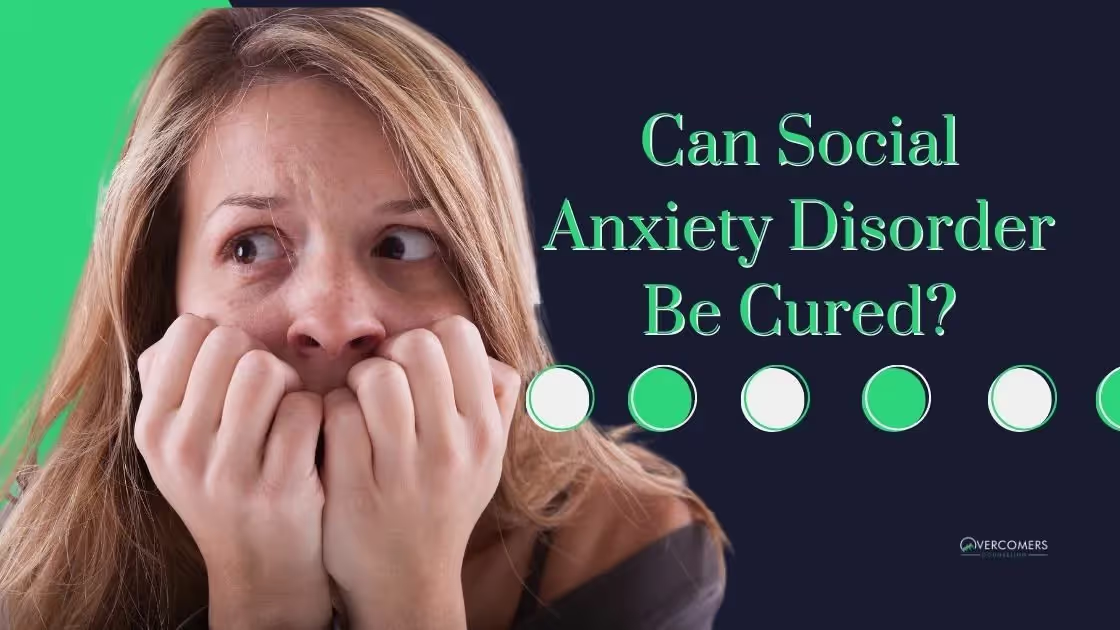Have you ever been afraid and tensed before a presentation in your office?Did your fear subside or increase during the event? Did it almost lead to a panic...

Have you ever been afraid and tensed before a presentation in your office?
Did your fear subside or increase during the event?
Did it almost lead to a panic attack?
If you've experienced any of these, and are wondering can social anxiety disorder be cured?
The answer is, yes.
Social anxiety disorder can be cured.
One way to cure social anxiety disorder is by therapy.
Now, what is social anxiety disorder?
Social anxiety, also called "social phobia", is an anxiety disorder, that is characterized by intense fear situations especially when you are the center of attention.
This fear quickly deepens when you are called upon to speak in front of a group of people or when observed by people who do not belong to your entourage.
It is a problem for many modern people around the world.
It is a public health problem with severely negative consequences for the individual and society.
Some affected individuals reported that social anxiety disorder significantly limited their functioning at work and school.
However, it mainly affects people between the ages of 20 and 32, and among them mainly are men because women can share with a friend and relieve this stress of experiences.
It is more difficult for men to do this because of many conceptions of society.
Social anxiety becomes a disorder when the symptoms of social anxiety are so severe that they significantly affect the quality of daily activities.
These are difficult experiences in which feelings of fear and anxiety are associated with social situations.
People with social anxiety disorder are more likely to fear public shame and may experience intense stress in situations like:
People with social anxiety disorder experience fear or anxiety that is not proportional to the situation, they are afraid of the fear itself.
For example, severe anxiety/fear during a job interview is another form of social anxiety disorder.
No one knows what causes social anxiety disorder, it usually starts after a person is faced with a situation of particular discomfort, negative experience, or wrong relationships with parents or people who replace them.
Some people refer to social anxiety disorder as "shyness", even though social anxiety disorder causes much more physical and psychological conditions than just normal shyness.
Some causes are:
Individuals with social anxiety disorder tend to avoid anything that can cause humiliation
For instance, they avoid giving public speeches for fear of stuttering.
It can be expressed as follows: a sharp redness of the face, impossibility or difficulty in making eye contact, sweating excessively, and hand tremors.
Anxiety disorders tend to be rooted in families or family traditions.
The extent to which these behaviors are inherited is not known for sure.
Since social anxiety stress is well treated with antidepressants, it can be assumed that it is associated with a serotonin deficiency.
This substance is called a neurotransmitter and can play an important role in social anxiety disorder.
A specific part of the brain known as the amygdala is involved in controlling the anxiety response.
People with social anxiety stress may have features in the structure of the tonsils.
If a family member suffers from social anxiety, it is more likely that another member of that family is affected by this disorder than in a family where no one is affected.

They also seem to play a role in the emergence of social anxiety disorder.
People with social anxiety disorder were often overwhelmed by parents who did not encourage them to get in touch with others in school and neighborhood.
Although mild social anxiety disorder usually resolves on its own through the process of gaining life experience.
Treatment and special attention are necessary for social anxiety disorder and may include;
If you're one of those who ask if can social anxiety disorder be cured, one of the ways to manage the situation is through cognitive therapy.
This is a treatment where the therapist centers more on accepting the fear.
The therapist tells them to challenge their fears in any situation and to shift their attention to things they have always wanted to do.
All they have to do is to accept it inwardly and focus outwardly.
Cognitive therapy has a better effect in the long term than just drugs.
85% of people with social anxiety disorder became completely healthy after undergoing cognitive therapy.
The second answer for you if you're looking for the answer to the question, can social anxiety disorder be cured is Meta Cognitive Therapy.
This kind of therapy is where the therapist works with the patient's thoughts, reactions, and beliefs.
They are taught to regulate their attention processes and train with new mental tasks.
Even in the worst cases, the combination of a variety of treatment methods might be successful.
To make the diagnosis of social anxiety disorder, it is necessary to make sure that the person presents persistent fear when exposed to the eyes of others.
Note that People with social anxiety disorder are afraid to say or do anything that could cause others to judge them negatively.
The healthcare professional may refer to the diagnostic criteria for social anxiety disorder that appear in DSM IV (Diagnostic and Statistical Manual of Mental Students - 4th Edition ) or ICD-10 (International Statistical Classification of Diseases and Related Health Problems - 10th Edition ).
The professional will conduct precise clinical interviews to monitor for signs of this disorder.
Many scales, such as the Liebowitz Social Anxiety Disorder Scale can be used by physicians and psychologists.
They can use them to objectively validate their diagnosis and assess the intensity of the patient's social anxiety disorder.
It is important to understand that, unlike normal social anxiety, social anxiety disorder is a disease that affects everyday life.
Desperate measures need to be taken to help people overcome this disorder.
Also, know that people with social anxiety disorder seek to avoid disturbing situations where they have to come in contact with other people.
They are very aware of their difficulty and will often consult slowly as they are often ashamed of their disorder.
So we all should join hands and help friends and families with this disorder overcome it.
The duration of anxiety counseling varies for each individual, depending on the severity of their anxiety and their progress in therapy. Our therapists will regularly assess your progress and adjust your treatment plan as needed.
Other activities which have been found helpful in reducing both immediate feelings of anxiousness and long-term anxieties associated with chronic disorders include yoga, journaling, nature walks, art therapy, volunteering, and other low-stress activities. Additionally, developing a healthy lifestyle incorporating adequate sleep, physical activity, and nutritious meals can help reduce overall stress levels.
To reduce your anxiety, you can practice relaxation techniques such as deep breathing, progressive muscle relaxation, guided imagery, and mindfulness practices. Additionally, regular exercise has been found to be beneficial in managing stress and improving mental health.
Addressing anxiety is crucial because it can significantly impact your quality of life and overall well-being. Left untreated, anxiety can lead to more severe mental health issues, relationship problems, and difficulty functioning in daily life.
It's important that you feel comfortable discussing personal matters with your therapist in order to open up and get more out of therapy sessions; therefore finding someone who meets certain criteria like experience level, expertise areas, and personality is key when selecting a therapist who can give meaningful feedback about how best handle issues related to anxiety or other mental health concerns.
Yes, Medicaid provides insurance coverage for therapy services specifically designed to help individuals struggling with anxiety, depression, and other mental health conditions.